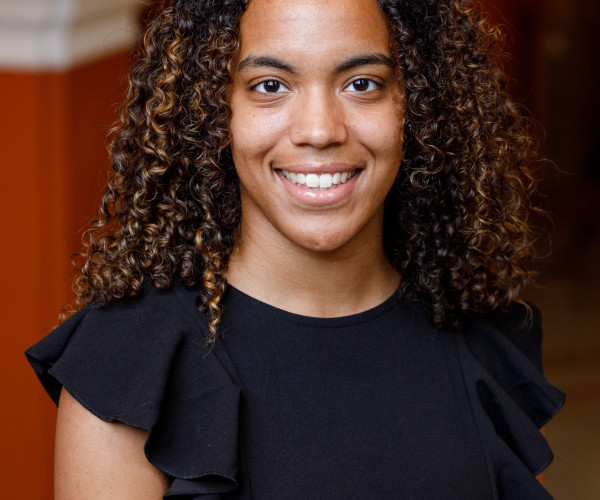Leticia Salazar L’22, one of three Penn Law inaugural First Generation Professional fellows
In Fall 2019, Leticia Salazar became one of three inaugural fellows of the Center on Professionalism’s First Generation Professionals (FGP) Fellowship.
Salazar studied at Penn as an undergrad, earning her B.A. in Health and Societies, with minors in Law and Society and Hispanic Studies. Through her work on various research projects with Penn Law Professor Dorothy Roberts, Salazar was inspired to pursue a cross-disciplinary education, combining a JD degree with a Master’s in Education Policy.
Salazar’s background and ambitions, along with her unique academic interest, are part of what adds vibrancy and diversity to the Penn Law student cohort and community.
Inspired by mentorship
As early as 6th grade, Salazar’s Harlem-based charter school stressed the importance of making connections. Salazar said, “The school encouraged students to make sure they had teachers they could rely on for letters of recommendation.” “They taught the importance of building a network and always having resources who can speak positively about you,” Salazar continued.
Beyond that, they “taught them important life skills like how to apply for after school jobs,” a practical skill that is often left out of traditional education. Salazar credits her understanding of the importance of mentoring and making professional connections to lessons learned while in primary education.
Professor Roberts became a mentor to Salazar during their time researching together and when Salazar expressed an inclination for both health and education policy, Professor Roberts encouraged her to consider law school, as this would set her in the best possible place to use her degree to work in that field.
Having spent her undergraduate years at Penn and getting to know and love the city of Philadelphia, Salazar made the decision to apply and attend Penn Law. She also became interested in the joint-degree program between the law school and Penn’s Graduate School of Education, where she could supplement her Health Policy background with a degree focused on Education Policy.
Positionality
The power of great mentorship was part Salazar’s decision to attend law school, however, the inspiration for what she wants to achieve professionally came while working as a medical information specialist at law firm Pond Lehocky. It was here Salazar really awakened to the disparity between herself and those she was helping at the firm, whose backgrounds were very similar to her own.
At the firm, Salazar found that “many people who do not actively try to be empathetic to our clients’ economic, physical, and emotional situations came off as condescending without realizing it.” Salazar was invited to help address this issue in the firm’s diversity training.
In these training sessions, Salazar spoke about the disconnect that existed due to barriers in both health and education, relating that many clients might be embarrassed to be vulnerable with staff because they felt a sharp sense of difference.
While working at the firm, Salazar found that “not in spite of, but because of my background, I quickly became one of the most in-demand workers by our clients and one of the first people they would ask to speak with when they called into the office.” This experience demonstrated to her the intense need clients feel to deal with someone they feel can relate to their circumstances.
This led Salazar to think about the importance of positionality and representation in the legal space and how her presence in it could positively contribute to helping decrease the gap between legal clients and practitioners. The shared ambition with the FGP program made her the perfect candidate for the fellowship.
Like the two other FGP fellows, Salazar intends to use her role as a fellow to help mentor other First Generation Professionals interested in legal education. With initiatives like the FGP program and fellowship, Penn Law hopes to place more leaders in the legal community with a diversity of experiences, education, and background.





